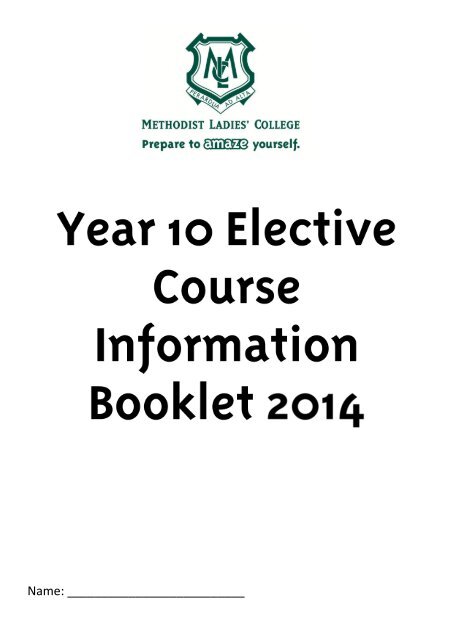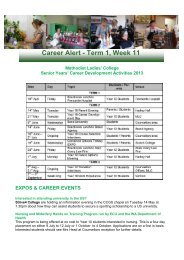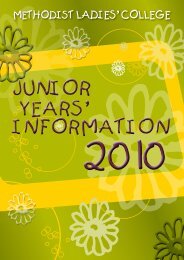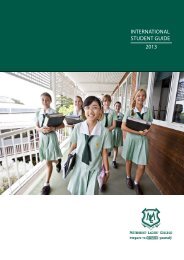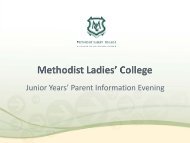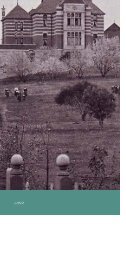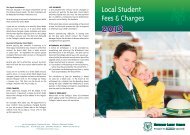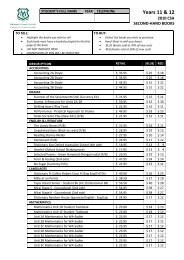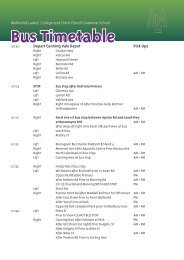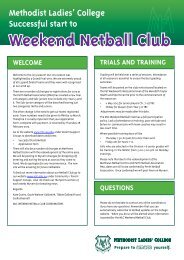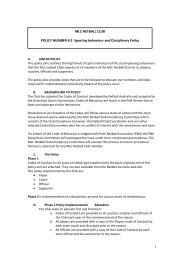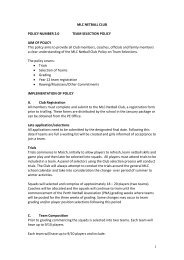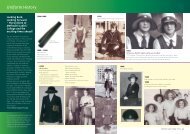Year 10 Subject Selection Booklet - Methodist Ladies' College
Year 10 Subject Selection Booklet - Methodist Ladies' College
Year 10 Subject Selection Booklet - Methodist Ladies' College
Create successful ePaper yourself
Turn your PDF publications into a flip-book with our unique Google optimized e-Paper software.
Name: __________________________
MLC SENIOR YEARS’ PROGRAM CURRICULUM INFORMATION – YEAR <strong>10</strong><strong>College</strong> ValuesWe value and foster:‘Christian foundations in life’‘Courage, resilience and confidence’‘Community Spirit which celebrates diversity’‘Striving to make the most of individual gifts’‘Respect, for self, others and the environment’Senior <strong>Year</strong>s’ Program GoalsThe aim of the Senior <strong>Year</strong>s’ Program at MLC is to assist students to:Enjoy a safe and supportive school environmentPursue a learning pathway that enables them to have a successful school experienceEnhance self awareness and knowledge to make informed choicesBuild employability skills and resilience to negotiate changing life and work rolesTransition from school with confidence, optimism and a sense of excitement about the futureOVERVIEWThe curriculum offered in the Senior <strong>Year</strong>s’ Program aims to provide students with meaningful and enjoyablelearning experiences which will build a foundation for lifelong learning and future education and employment. The<strong>College</strong> learning programs cater for a diverse range of student abilities and interests, with course work providingboth challenge and rigour. Each student is offered broad-based opportunities to explore and develop her potentialby engaging with teachers and peers in a safe learning environment.The curriculum has two foci: academic learning and pastoral care. In tandem with the academic curriculum, thepastoral care curriculum, delivered through the Tutorial Program, encourages a sense of belonging and communityin each student. This program focuses on seven themes of Self and Relationship Management, Healthy Lifestyles,Civic Responsibility, Celebrating Diversity, Global Perspectives, Career Development and Developing CommunityNetworks.The academic curriculum reflects contemporary thinking about essential learning and skills needed by students tolead successful and rewarding lives in a rapidly changing global and technological world. Students are encouraged tothink critically and creatively and to take responsibility for their own learning. Development of expertise in the use ofmodern technologies is made possible through the extensive resources of the <strong>College</strong>.The educational programs for <strong>Year</strong> <strong>10</strong> embody the Overarching Statement contained in the Curriculum Frameworkdocument which outlines the desired knowledge, understandings and values all Western Australian students shouldacquire as a result of their schooling.YEAR <strong>10</strong> PROGRAM<strong>Methodist</strong> Ladies’ <strong>College</strong> operates a <strong>10</strong> day timetable cycle with six periods per day, giving students a total of 56curriculum-based periods. The remaining four periods are devoted to Tutorial, House, Chapel and Assembly.In <strong>Year</strong> <strong>10</strong>, students study a combination of compulsory subjects and selected subjects. The compulsory subjects areEnglish, Mathematics, Science, Society and Environment, Unit 1C Career and Enterprise, Christian Education, Healthand Physical Education.Selected subjects are offered in a number of different configurations making a total of 12 periods.2
MLC SENIOR YEARS’ PROGRAM CURRICULUM INFORMATION – YEAR <strong>10</strong>SELECTED SUBJECTSSelected subjects should ideally fit one of the following configurations:Two (2) six period subjects6P6PorOne (1) six period subjects and two (2) three period subjects6P 3P 3P<strong>Subject</strong> selections will be affected by timetable and class size restrictions and limitationplaced on the number of classes running in 2014.WACE courses and MLC Elective courses.In 2014, as well as the usual MLC <strong>Year</strong> <strong>10</strong> Elective courses, there are WACE level 1 courses on offer; the primarydifference being that there is a statutory requirement to deliver the WACE course as prescribe by the CurriculumCouncil, including assessments. Students who successfully complete the units within these WACE courses will havethem recognised on their WACE Certificate.All <strong>Year</strong> <strong>10</strong> students will be studying the Compulsory Unit 1C from the Career and Enterprise WACE course and onsuccessful completion, will be credited with 1 unit on their WACE certificate.ON-LINE <strong>Subject</strong> <strong>Selection</strong> Forms are due to MY Reception by 4 July 2013CONTACTS TABLEAcademic Dean (K – 12) Bruce Wilkinsbwilkins@mlc.wa.edu.auHead of Counselling & Career Services:Mrs Sue Shawsshaw@mlc.wa.edu.auHead of <strong>Year</strong> 9:Mrs Donna Kolkadkolka@mlc.wa.edu.auHead of Creative Arts:Ms Jenny Dilkesjdilkes@mlc.wa.edu.auHead of English:Ms Hani Khanhkhan@mlc.wa.edu.auHead of Languages:Ms Maria Outtrimmouttrim@mlc.wa.edu.auHead of Physical Education:Mr Paul Birchpbirch@mlc.wa.edu.auHead of Theatre Arts:Mrs Jodee Lambertjlambert@mlc.wa.edu.auHead of Counselling and Career Services:Mrs Robyn Blackburnrblackburn@mlc.wa.edu.auHead of Staff and Student Services:Mr Kim Christiansenkchristiansen@mlc.wa.edu.auHead of Mathematics:Dr Dennis Irelanddireland@mlc.wa.edu.auA/Head of Science:Mr Bill Biffinbbiffin@mlc.wa.edu.auHead of Social Science:Mr David Forddford@mlc.wa.edu.auHead of Home Economics:Mrs Susan Millersmiller@mlc.wa.edu.auHead of Music:Dr Robert Faulknerrfaulkner@mlc.wa.edu.au3
MLC SENIOR YEARS’ PROGRAM CURRICULUM INFORMATION – YEAR <strong>10</strong>2014 MLC Elective Choices FLEXIBLE SUPPORT PROGRAM (3 periods) (by Teacher referral)The Flexible Support program is designed to support students who may require extra support with literacy skills or aparticular learning difficulty. Students are nominated by staff for this program and parents are then contacted todiscuss a student’s inclusion in this program. Flexible support teachers work with students on an individual basis, insmall groups and within the classroom setting. It is recommended that parents contact Mrs Robyn Blackburn if youwould like more information in this program. rblackburn@mlc.wa.edu.auStudents who experience learning difficulties benefit most from explicit teaching of concepts, skills and learningstrategies. In this context the Flexible Support Program strives to develop the student’s repertoire of learning toolsthat can be applied across learning areas. The specific needs of each student are addressed through developing anawareness of her particular learning style and strategies that maximise her engagement and success in learning.As learning differences emerge or are identified, programs will be modified to meet individual needs. CHILDREN, FAMILY and the COMMUNITY (3 Periods)Students choosing this course need to have a genuine desire to work with children. The focus is practical. Children,Family and the Community is part of the Health and Physical Education learning area and leads onto the Children,Family and the Community Course of Study offered in <strong>Year</strong> 11.In <strong>Year</strong> <strong>10</strong> the course is made up of 3 units. Topics will include family, pregnancy, birth and the neonate; growth anddevelopment and language; and illness, safety and play. Invited guests will enhance the students’ experiences as wellas excursions to a number of places. The course will include spending time with the ‘virtual’ baby.Assessment part of the assessment.A portfolio of notes and in class activities will form part of the assessment. As well, student will complete a writtenreport on each visitor or visit made and their evaluation of the ‘virtual’ baby. They will produce a ‘growth chart’ and‘immunisation chart’ and a book for a toddler. As well they will plan, prepare for and run games for children in theearly learning years.Portfolio <strong>10</strong>%Investigation 15%Production 25%Response 50% ANCIENT HISTORY (3 periods)The study of Ancient History is the process of making meaning of the distant past in order to understand ourpresent. Students engage with different cultures, values, traditions, societies, technologies and political structures.They reflect upon their own community: its beliefs, values and traditions. Such reflection reveals the deepfoundations of many contemporary values, issues and ideals and lays bare the many continuities of the present withthe ancient past. Studying Ancient History is also fundamentally interesting and enjoyable. Students engage with themysteries of the past, and seek out the evidence about them. It provides an opportunity for students to study peoplefrom cultures and communities that no longer exist and discover how they responded to the problems andchallenges of their time.They are exposed to a variety of historical sources of both a textual and a material nature such as letters, contracts,treaties, histories, speeches, reliefs, buildings and works of art, in order to determine cause and effect, and themotives and forces influencing people and events.Students will study one of the following four civilisations; Ancient Egypt, Ancient Greece, the Aztecs and the RomanEmpire. <strong>Selection</strong> of topics will depend on student areas of interest and include famous people, structures and events,daily life, gods and beliefs, the hierarchical structure and government, its downfall and legacy to the modern world.Students will be given the opportunity to follow their interests and complete an historical investigation into their ownchosen civilisation.4
MLC SENIOR YEARS’ PROGRAM CURRICULUM INFORMATION – YEAR <strong>10</strong> SMALL BUSINESS MANAGEMENT (3 periods)Business requires people who are enterprising, innovative and creative. The Small Business Management coursefocuses on the development of these skills within the business cycle of the establishment, day to day running,manufacturing, sales, marketing and continuing viability.Students form partnerships and establish and operate their own small business ventures. The partnership groupdetermines the product idea then surveys the market and analyses the results. They prepare a business plan, amarketing plan, determine their strengths, weaknesses, opportunities and threats (SWOT), manufacture theproducts, market and sell them, record financial data and prepare final reports. Students each have managerialresponsibilities and work within a team.The course provides students with the opportunity to be creative and enterprising, to seek ways to optimise asituation, to problem solve and analyse in order to promote growth and to add value to a situation. Students have anumber of opportunities to sell their product both through ordering from their displays in the Resource Centre andon Small Business Day at the Trade Fair. Through this practical simulation students acquire first hand businessknowledge and experience, enabling them to develop a range of skills required to establish and operate a smallbusiness.This course, offered by the Society and Environment Department, aims to empower students to make soundbusiness decisions, linked to a set of values, and to demonstrate outcomes within the Resources and Natural SocialSystems strand. With this approach, it is envisaged that our future managers will also grow to be leaders, not onlywithin organisations, but also within themselves. SUSTAINABLE FUTURES (3 Periods)Sustainable Futures is a project-based course that looks at what we as individuals can do to protect our surroundingsfrom changes that may be detrimental in time to come.The unit will prepare our students for the future. The work will be based on experiential learning that will ensure ourstudents know, love and consequently value their own environment. Students will be empowered to find solutionsto historically mismanaged aspects of human activity and gain experience in leadership through planning andexecuting actions that encourage others to make positive changes. Students will have access to outside expertise asthey gain a broad technical and social understanding of where solutions might be found and what is currentlyhappening to allow for more sustainable use of resources.The aim of the unit is to encourage students to have confidence and faith in the future management of our planetand an awareness of how they can contribute to that management. THEATRE ARTS DRAMA (3 periods)This subject is great fun, with lots of performance opportunities and workshop activities. Performance skills,theatrical conventions, styles and genres are explored in more depth through improvisation, role play, play-buildingand exploration of scripted works. Students have many opportunities, both in small groups and individually, tocreate and perform their work. Many different styles, ideas and situations are examined allowing students to buildtheir knowledge of theatrical forms as well as develop their communication and performance skills.The course has been developed to ensure that all the Drama elements covered in a fun and educational way. Theseare explored through a range of topics which include the exploration of Australian Theatre, Monologues, Duologues,Physical Theatre and Youth Theatre.Students intending to study Drama in <strong>Year</strong>s 11 and 12 are encouraged to select this subject.5
MLC SENIOR YEARS’ PROGRAM CURRICULUM INFORMATION – YEAR <strong>10</strong>Performance/productionExtended performance/production project in which students explore ideas, rehearse, perform and/or produce danceworks.A practical performance is included in this assessment type. Other types of evidence may include observationchecklists or evaluation tools (self, peer), videos of students.ResponseStudents apply their knowledge and skills in analysing and responding to their own dance and that of others.Response to, analysis and evaluation of their own and others’ or professional dance works.A written component is included in this assessment type. Types of evidence may include: journal entries, observationchecklists, evaluation tools (self, peer), critical reviews and essays.InvestigationResearch work in which students plan, conduct and communicate an investigation in the form of case studies. Thefindings may be communicated in any appropriate form e.g. written, oral or graphical, or various combinations ofthese. 1A & 1B Materials Design and Technology - Textiles (6 periods) WACE CourseThis is a practical course where students can choose to work with textiles in the design and manufacture of products.This is also a course about ideas, innovation and creativity. This course includes: Unit 1AMDTT and Unit 1BMDTTIn order to do these well, students research and test materials and use strategies to develop innovative and creativeideas. They apply skills of management in planning and implementing a process, at the same time as theymanipulate tools and machines to produce high-quality products.Unit 1AMDTTThe focus for this unit is production fundamentals. It is an introductory unit for those students who have limitedexperience in the manufacturing of products. Students are introduced to principles and practices of design, and thefundamentals of design required to manufacture products for themselves. They learn to communicate variousaspects of the design process within the structure of ‘design, make and appraise’.Throughout the process, students learn about materials, including their origins, classifications, properties andsuitability for purpose. Students use the technology process and are introduced to relevant technology process skills.Students work in a defined environment and learn to use a variety of relevant production technologies safely andeffectively.Unit 1BMDTTThe focus for this unit is design in practice. It is for students who have informal experiences of interacting with avariety of products that have been designed to meet certain needs. Students apply the fundamentals of design andconcepts related to designing for self or others, considering factors such as social and environmental influences.They learn to communicate various aspects of the technology process within the context of making what theydesign.Throughout the process, students learn about the origins, classifications and suitability for purpose, of materials theyare using.Students are introduced to a range of production techniques and equipment, and develop skills, generate plans andrealise their design ideas through the production of their design project.Type of assessments:DesignResearch work in which students conduct and communicate an investigation.7
MLC SENIOR YEARS’ PROGRAM CURRICULUM INFORMATION – YEAR <strong>10</strong>ProductionExtended and manufacturing project/s where students control, evaluate and manage processes.ResponseStudents apply their knowledge and skills in responding to a series of stimuli or prompts in the following formats:exam, essays, oral responses, ICT visual responses and product evaluation reports.Students successfully completing this course will be accredited with two Stage 1 units of the Materials Design andTechnology - Textiles Course on their WACE Graduation Certificate. 1A & 1B THEATRE ARTS DRAMA (6 periods) WACE CourseDrama is about confidence, team work and fun. This course is designed to provide students who really enjoy TheatreArts with the opportunity to further their drama experience beyond what the three period course can provide,through the provision of performance opportunities, excursions to local theatres and more intensive exploration of arange of styles.The course has been developed to ensure all the Drama elements covered in a fun and educational way. These areexplored through a variety of contexts including Physical Theatre, Medieval Theatre, Absurdist Theatre, YouthTheatre, and Publicity for the Middle School Production plus exploration of both Australian and ShakespeareanTheatre, students develop their performance skills and understanding of theatrical conventions.Students intending to study Drama in <strong>Year</strong>s 11 and 12 are encouraged to select this subject. 1C & 1D Applied Information Technology (6 Periods) WACE CourseIn this course, students use a range of computer hardware and software to create, manipulate and communicateinformation. Using a range of applications, students investigate, design, construct and evaluate ICT solutions in arange of environments. The result is a set of skills to equip the student for the 21st century and give them anappreciation of the impact of information technology on society in general. This course includes: Unit 1CAIT and Unit1DAITUnit 1CAITThe focus for this unit is personal information and communication technologies and using technology to meetpersonal computing needs. This includes the study of how individuals use, and can be affected by, informationtechnology in their daily lives. Students investigate computer systems and understand the configuration needed tomeet their personal needs. They acquire and apply a range of knowledge and skills to create information solutionsthat inform, persuade, educate or entertain.Unit 1DAITThe focus for this unit is community information and communication technologies and using ICT commonly requiredin the operation of a small business or community organisation. Students investigate small business networks andthe peripheral devices required to use communication and graphics applications. They understand the configurationrequired for a small business computing system. They examine the impact of information technology solutionswithin the community.Types of assessment in this unit:InvestigationResearch work in which students plan, conduct and communicate an investigation.Investigation of ICT-related issues or cultural contexts, exploring a range of primary and secondary sources.Production or performanceExtended production project in which students explore ideas and control the processes required to manage thequality of production. Students engage in an activity or on-the-spot evaluation of a performance. This may be onelarge production/performance task or it may be two or more smaller tasks.Manage a range of production processes, evaluating and modifying them as necessary. Demonstrate an8
MLC SENIOR YEARS’ PROGRAM CURRICULUM INFORMATION – YEAR <strong>10</strong>understanding of styles, structures, codes and conventions and the development of confidence and competence inthe use of technologies, skills and processes in a range of contexts.Types of evidence may include: a journal to show evidence of exploration and the development of ideas, reflectionon learning processes and critical evaluation and modification of ideas, portfolios and products.ResponseStudents apply their knowledge and skills in analysing and responding to a series of stimuli or prompts.Response to, analysis and evaluation of own or professional information technology products.Types of evidence may include: observation checklists, journal and evaluation tools (self or peer).ExaminationStudents apply their understanding and skills in Applied Information Technology to analyse, interpret, solveproblems and answer questions in examination settings.Students are required to use technical terminology, apply knowledge and application of Applied InformationTechnology skills. Types of questions will include multiple choice, short answer, extended answer and production.1A & 1B Food Science and Technology – Hospitality (6 Periods) WACE courseFood Science and Technology provides opportunities for students to develop their food related interests andunderstandings through the design and production of food related products, services or systems within the choice ofthree contexts: hospitality, nutrition and health promotion; and product development. Students have opportunitiesto develop enterprising capabilities (creativity, initiative, innovation, risk management and lateral thinking) and use arange of technology skills (organisational, operational and practical) to undertake and manage food relatedchallenges.They develop self management and communication skills critical to facilitate working with others to design, produceand evaluate products, services or systems. Students understand and question how beliefs and values influenceconsumer and producer decisions about the appropriate use of food and related equipment, consideringsustainability, social justice, ethical, economic and political implications. Through the application of the technologyprocess, students have opportunities to develop their creativity and advocate for improvements while betterunderstanding food related trends and issues.Unit 1AFSTH – Spotlight on my foodStudents explore ways in which individuals select and use foods, and how this is determined by family customs,lifestyle, budget, availability of food and food preparation skills. They learn about the variety and availability offamiliar, local foods and use food selection models to determine their place in a balanced diet. They use strategies toidentify the cultural values of their peers and the sensory characteristics of food that impact on their foodpreferences and food choices. Students identify their personal food requirements and the influence of food choiceon health. They identify trends in the food industry that influence their food selections. Factors that affect the localfood supply and personal food production systems are examined. They identify the laws and regulations that ensurea safe, local food supply and the preparation and storage techniques that prevent food contamination.Unit 1BFSTH- Food, health and choicesIn this unit students learn about a balanced diet and apply nutrition concepts that promote healthy eating. Theyappreciate that everybody is different and that food needs and preferences vary. Students learn about healthy andunhealthy foods and classify these according to nutrient content, variety, availability, storage and cost. They gainknowledge of the function of food in the body and the nutrient needs of adolescents. Students determine thepersonal, physical, intellectual, emotional, social and spiritual needs and wants that define their eating habits. Theystudy the impact on their health of dietary decisions that result from their food consumption and lifestyle patterns.The ethics of the practice and influence of food manufacturers and the media on the food choices of the adolescentmarket are examined.AssessmentThe assessment types of investigation, production and response will be used to determine a percentage for eachunit. Each assessment type is given different weightings for each unit.9
MLC SENIOR YEARS’ PROGRAM CURRICULUM INFORMATION – YEAR <strong>10</strong>Investigation 20% - 30%Production 50% - 70%Response <strong>10</strong>% - 20%Student achievement will be reported in terms of a grade and a percentage.1A&1B Physical Education Studies (6 periods) - WACE course.Physical Education Studies is not a prerequisite for the Physical Education Studies Course in <strong>Year</strong>s 11 and 12 but itwould be an advantage to have completed the course. This course includes two Units: 1APES and 1BPESPhysical Education Studies contributes to the development of student’s physical, social and emotional growth.Students learn about functional anatomy, physiological, psychological, and biomechanical principles and apply theseto analyse and improve personal and group performances in physical activities.Throughout the course, students learn through integrated written, oral and active learning experiences. The coursealso provides students with opportunities to develop skills that will enable them to pursue personal interests andpotential in physical activity as athletes, coaches, officials, administrators and/or volunteers.Unit 1APESThe focus of this unit is the development of students’ knowledge, understanding and application of anatomical,physiological and practical factors associated with performing in physical activities.On completion of this unit, students should be able to: develop and apply basic skills associated with their chosen sports understand the basic process of coaching/teaching a skill understand the phases of learning and the classifications of motor skills identify the major bones in the human body understand the reasons for learning biomechanics understand components of fitness and apply simple tests to measure these identify and apply characteristics of warm-up and cool down understand skills and strategies for team building and preparing mentally for physical activity.Unit 1BPESThe focus of this unit is to allow students to begin to understand the impact that physical activity has on the body’sanatomical and physiological systems which enable them to extend their knowledge of the effectiveness andefficiency of their performance as team members/individuals.On completion of this unit, students should be able to: identify fundamental tactical problems associated with specific types of physical activity apply solutions to basic tactical problems understand the different physical activity classifications explain the structure and function of the circulatory and respiratory systems identify the major skeletal muscles in the human body understand basic biomechanical principles relating to motion define the anaerobic, aerobic and lactic acid energy systems have a basic understanding of the responses of the circulatory and respiratory systems to physical activity apply observation skills to assess personal performance understand the elements of a training session explain the relationship between fitness levels and skill development understand the role of mental skills in creating a mind set to enhance performance.<strong>10</strong>
MLC SENIOR YEARS’ PROGRAM CURRICULUM INFORMATION – YEAR <strong>10</strong>Assessment:The assessment types of performance, investigation and response will be used to determine a percentage for eachunit. Each assessment type is given different weightings for each unit.Performance 30-50%Investigation 25-35%Response 25-35% CHINESE (6 periods)The <strong>Year</strong> <strong>10</strong> Chinese course builds on topics covered in <strong>Year</strong>s 8 and 9 and includes such topics as weatherforecasts, school life, asking directions, leisure life, travelling, and sickness.Study of culture is an integral part of the curriculum. Students continue to develop and refine their reading inChinese characters and character writing skills through exposure to a range of documents in the Chinese script andstructured study of grammar. Listening and speaking skills are developed through activities such as role-plays, pairwork, interviews, and the use of online vocabulary learning such as Language Perfect, CDs and DVDs..A student’s progress is assessed in the outcome strands of Listening and Responding, and Speaking; Viewing,Reading and Responding; and Writing.Students are taught in mixed ability groups and may choose to continue their studies into <strong>Year</strong>s 11 and 12.To take Chinese in <strong>Year</strong> <strong>10</strong>, a student must have studied <strong>Year</strong> 9 Chinese or its equivalent.As part of the <strong>Year</strong> <strong>10</strong> course, all students will sit the Assessment of Language Competence Certificates Exam atCertificate 2 level in Chinese.The University of Western Australia, Curtin University, Murdoch University, Edith Cowan University, and otherEastern States Universities have introduced a Bonus Point scheme for students who successfully complete alanguage study up to <strong>Year</strong> 12. All current <strong>Year</strong> 9 students who opt to study a language to <strong>Year</strong> 12, 2016 will begiven bonus points to the score they receive in Japanese, German, Chinese, or French in their WACE Exams. FRENCH (6 periods)The <strong>Year</strong> <strong>10</strong> French course builds on topics covered in <strong>Year</strong>s 8 and 9 and includes the new topics of holiday andexchange experiences, the world and the environment, school, part-time jobs, family life and French festivals andtraditions.Study of culture is an integral part of the curriculum. Students continue to refine and expand their reading andwriting skills through exposure to a wide range of documents and structured study of grammar. They areencouraged to read authentic magazines, which are provided. Speaking skills are further developed throughactivities such as interviews, speeches, role-plays, pair work, and the use of online vocabulary learning such asLanguage Perfect, CDs and DVDs.A student’s progress is assessed in the outcome strands of Listening and Responding, and Speaking; Viewing,Reading and Responding; and Writing.Students are taught in mixed ability groups and may choose to continue their studies into <strong>Year</strong>s 11 and 12.To take French in <strong>Year</strong> <strong>10</strong>, a student must have studied <strong>Year</strong> 9 French or its equivalent.As part of the <strong>Year</strong> <strong>10</strong> course all students will sit the Alliance Française Examination.11
MLC SENIOR YEARS’ PROGRAM CURRICULUM INFORMATION – YEAR <strong>10</strong>The University of Western Australia, Curtin University, Murdoch University, Edith Cowan University, and otherEastern States Universities have introduced a Bonus Point scheme for students who successfully complete alanguage study up to <strong>Year</strong> 12. All current <strong>Year</strong> 9 students who opt to study a language to <strong>Year</strong> 12, 2016 will begiven bonus points to the score they receive in Japanese, German, Chinese, or French in their WACE Exams. GERMAN (6 periods)The <strong>Year</strong> <strong>10</strong> German course builds on topics covered in <strong>Year</strong>s 8 and 9 and includes the new topics of problems facingyoung people and family relationships, environmental issues, student exchanges, national identity, Germantraditions and superstitions.Study of culture is an integral part of the curriculum. Students continue to refine and expand their reading andwriting skills through exposure to a wide range of documents and structured study of grammar. They are encouragedto read authentic magazines, which are provided. Speaking skills are further developed through activities such asinterviews, speeches, role-plays, pair work, and the use of online vocabulary learning such as Language Perfect, CDsand DVDs.A student’s progress is assessed in the outcome strands of Listening and Responding, and Speaking; Viewing,Reading and Responding; and Writing.Students are taught in mixed ability groups and may choose to continue their studies into <strong>Year</strong>s 11 and 12.To take German in <strong>Year</strong> <strong>10</strong>, a student must have studied <strong>Year</strong> 9 German or its equivalent.As part of the <strong>Year</strong> <strong>10</strong> course all students will sit the DAS Examinations.The University of Western Australia, Curtin University, Murdoch University, Edith Cowan University and otherEastern States Universities have introduced a Bonus Point scheme for students who successfully complete alanguage study up to <strong>Year</strong> 12. All current <strong>Year</strong> 9 students who opt to study a language to <strong>Year</strong> 12, 2016 will begiven bonus points to the score they receive in Japanese, German, Chinese, or French in their WACE Exams. JAPANESE (6 periods)The <strong>Year</strong> <strong>10</strong> Japanese course builds on topics covered in <strong>Year</strong>s 8 and 9 and includes such topics as housing,The <strong>Year</strong> <strong>10</strong> Japanese course builds on topics covered in <strong>Year</strong>s 8 and 9 and includes such topics as housing, physicaldescriptions, clothing, weather forecasts, special dates and festivals, wants, eating out at a restaurant and shopping.Study of culture is an integral part of the curriculum. Students continue to develop and refine their reading andwriting skills through exposure to a range of documents in the Japanese script and structured study of grammar. In<strong>Year</strong> <strong>10</strong>, Japanese students are introduced to more kanji. Listening and speaking skills are developed throughactivities such as role-plays, pair work, interviews, and the use of CDs and DVDs.A student’s progress is assessed in the outcome strands of Listening and Responding, and Speaking; Viewing,Reading and Responding; and Writing.Students are taught in mixed ability groups and may choose to continue their studies into <strong>Year</strong>s 11 and 12.To take Japanese in <strong>Year</strong> <strong>10</strong>, a student must have studied <strong>Year</strong> 9 Japanese or its equivalent.As part of the <strong>Year</strong> <strong>10</strong> course, all students will sit the Assessment of Language Competence Certificates Exam atCertificate 2 level in Japanese.The University of Western Australia, Curtin University, Murdoch University, Edith Cowan University, and otherEastern States Universities have introduced a Bonus Point scheme for students who successfully complete alanguage study up to <strong>Year</strong> 12. All current <strong>Year</strong> 9 students who opt to study a language to <strong>Year</strong> 12, 2016 will begiven bonus points to the score they receive in Japanese, German, Chinese, or French in their WACE Exams.12
MLC SENIOR YEARS’ PROGRAM CURRICULUM INFORMATION – YEAR <strong>10</strong> MEDIA STUDIES (6 periods)Media Studies Extension offers opportunities for students to delve deeply into mediums including film andtelevision. Students will be challenged to look at the way they interact with media products and the ways in whichthe media can influence social and cultural values. Through analysis of both modern and historical exemplars andcreation of original music video clips, practical and theoretical skills in both video and photographic disciplines willbe developed.In addition to learning about professional studio portraiture, creative darkroom techniques offered within the studyof black and white photography will be explored, challenging the students’ approach to composing and creatingimages for a purpose. By using the genre of portraiture, students will experience professional studio photographyand apply skills in digital photography using Adobe PhotoShop.Film is studied through film marketing, narrative, deconstruction of images, analysis of global film trends andcultures and the creation of film trailers. More complex and creative filming techniques and editing processes willbe highlighted using programs from the Adobe Video Collection suite which enables students to mix soundtracks,add special effects and archive in DVD format.The deconstruction and analysis of media products lays a firm foundation for continuation into the Media Productionand Analysis, Design (Photography) and Visual Arts Courses offered in <strong>Year</strong>s 11 and 12.Media Studies offers stimulating and engaging theoretical and practical course work and would be of particularinterest to students wishing to pursue computer and media related employment or university courses in this field. MUSIC (6 periods)This Y<strong>10</strong> Music course offers students a course that combines practical music studies with music language,techniques and contexts, whilst focusing on students’ individual musical interests and emerging expertise. All <strong>Year</strong> 9students who have existing vocal or instrumental skills in areas of Classical Western Art Music or Popular,Contemporary and Jazz Music are welcome to apply for this elective, especially those who currently learn aninstrument or are taking voice lessons. Other students who may possess appropriate vocal or instrumental skills areinvited to consult with Music Staff before subject selection.The course builds strong and comprehensive musicianship skills in performing, composing, listening and analyzing. Itprovides excellent preparation for <strong>Year</strong> 11 and 12 Music courses in any of the three strands presently availablethrough WACE (Western Art Music, Jazz and Contemporary).Students do not need to be committed to taking music as a WACE subject in <strong>Year</strong> 11 and 12 to pursue Music as anelective in <strong>Year</strong> <strong>10</strong>.Students are able to develop performance skills as they are coached in a range of small group, chamber ensemble orsolo projects over the year with a particular emphasis on reflective performance practices. Students developmusicianship and music leadership skills and as part of performance based tasks, students also examine key musicworks and their historical and cultural contexts. In addition, students develop music perception and literacy, extendcomposing, improvising and arranging skills, and learn to use a range of technologies in support of music-making,music investigation and musicianship.Instrumental and Vocal LessonsIt is compulsory for all students who select <strong>Year</strong> <strong>10</strong> Music to learn an instrument or take voice lessons to enablethem to participate in a wide range of activities both in class and within ensembles offered at the <strong>College</strong>. Musicstudents may choose to use a private tutor or a tutor through the <strong>College</strong> for their instrumental or vocal lessons. Forfurther information, terms and fees see:http://www.mlc.wa.edu.au/view/instrumental-and-vocal-tuitionInstruments available for study at the <strong>College</strong> include:Strings: violin, viola, cello, double bass and harpGuitar: classical, acoustic and electric guitar13
MLC SENIOR YEARS’ PROGRAM CURRICULUM INFORMATION – YEAR <strong>10</strong>Percussion: classical (covers all percussion instruments) and kit drumWoodwind: flute, oboe, clarinet, bassoon, saxophone (alto, tenor, baritone)Brass: French horn, trombone, tuba, euphonium, trumpetVoice: classical, contemporary and jazzPiano (classical and jazz), organ VISUAL ARTS (6 periods)The subject is designed for students who have a real affinity with the Visual Arts, as it provides a greater opportunityto explore their artistic talents in depth.Students will be challenged to think creatively through a series of design briefs to develop resolved art works.Techniques of drawing, painting, print making, ceramics, sculpture, graphic design, textiles and mixed media aredemonstrated by staff and then explored by the student. Students are encouraged to research these studio areas indepth, making connections between their own personal work and that of practising artists.A process of visual inquiry, design development, media investigation and research of interrelationships fosters thedevelopment of sound skills and creativity. Students have the opportunity to present their art works to the collegeand wider community in the annual exhibition and in displays throughout the year.This Visual Arts course offers stimulating and engaging theoretical and practical course work and can be used as afoundation for further studies in many fields including the Design (Photography), Visual Arts and Media Productionand Analysis Courses in <strong>Year</strong>s 11 and 12. FLEXIBLE SUPPORT PROGRAM (6 periods) (by Teacher referral)The Flexible Support program is designed to support students who may require extra support with literacy skills or aparticular learning difficulty. Students are nominated by staff for this program and parents are then contacted todiscuss a student’s inclusion in this program. Flexible support teachers work with students on an individual basis, insmall groups and within the classroom setting. It is recommended that parents contact Mrs Robyn Blackburn if youwould like more information in this program. rblackburn@mlc.wa.edu.auStudents who experience learning difficulties benefit most from explicit teaching of concepts, skills and learningstrategies. In this context the Flexible Support Program strives to develop the student’s repertoire of learning toolsthat can be applied across learning areas. The specific needs of each student are addressed through developing anawareness of her particular learning style and strategies that maximise her engagement and success in learning.As learning differences emerge or are identified, programs will be modified to meet individual needs.14


